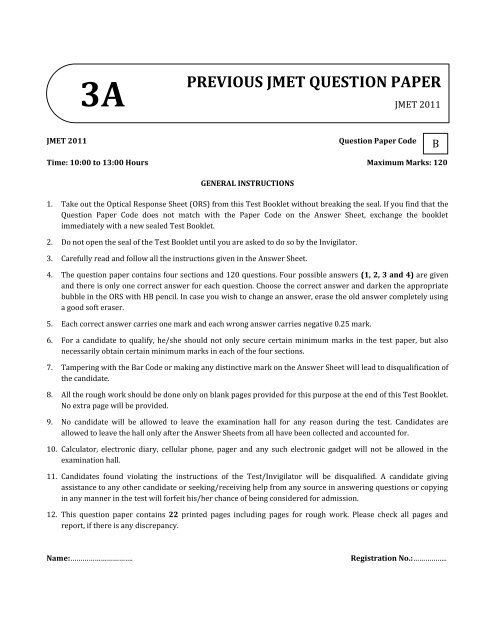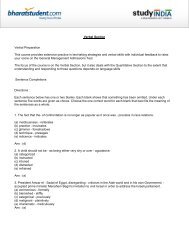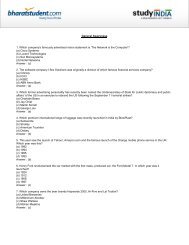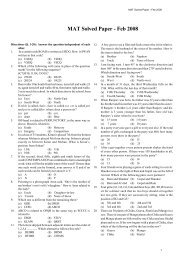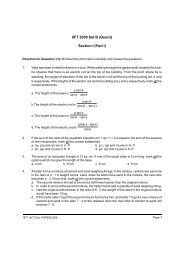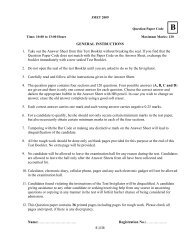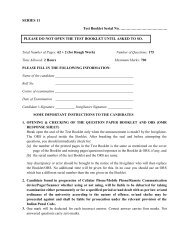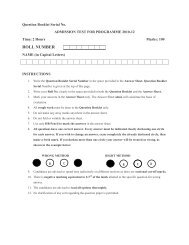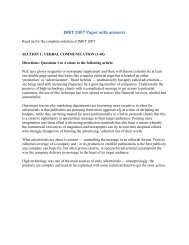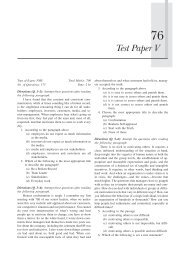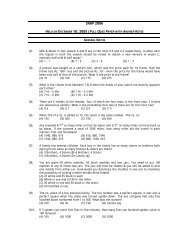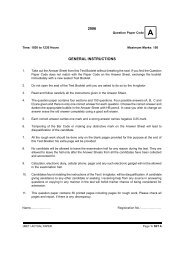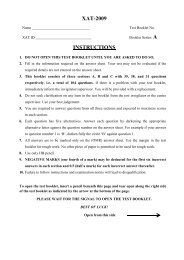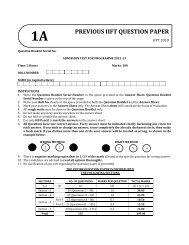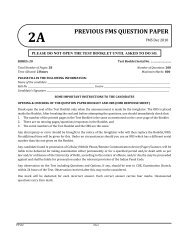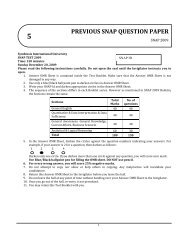PREVIOUS JMET QUESTION PAPER
PREVIOUS JMET QUESTION PAPER
PREVIOUS JMET QUESTION PAPER
You also want an ePaper? Increase the reach of your titles
YUMPU automatically turns print PDFs into web optimized ePapers that Google loves.
3A<br />
<strong>JMET</strong> 2011 Question Paper Code<br />
Time: 10:00 to 13:00 Hours Maximum Marks: 120<br />
GENERAL INSTRUCTIONS<br />
1. Take out the Optical Response Sheet (ORS) from this Test Booklet without breaking the seal. If you find that the<br />
Question Paper Code does not match with the Paper Code on the Answer Sheet, exchange the booklet<br />
immediately with a new sealed Test Booklet.<br />
2. Do not open the seal of the Test Booklet until you are asked to do so by the Invigilator.<br />
3. Carefully read and follow all the instructions given in the Answer Sheet.<br />
<strong>PREVIOUS</strong> <strong>JMET</strong> <strong>QUESTION</strong> <strong>PAPER</strong><br />
4. The question paper contains four sections and 120 questions. Four possible answers (1, 2, 3 and 4) are given<br />
and there is only one correct answer for each question. Choose the correct answer and darken the appropriate<br />
bubble in the ORS with HB pencil. In case you wish to change an answer, erase the old answer completely using<br />
a good soft eraser.<br />
5. Each correct answer carries one mark and each wrong answer carries negative 0.25 mark.<br />
<strong>JMET</strong> 2011<br />
6. For a candidate to qualify, he/she should not only secure certain minimum marks in the test paper, but also<br />
necessarily obtain certain minimum marks in each of the four sections.<br />
7. Tampering with the Bar Code or making any distinctive mark on the Answer Sheet will lead to disqualification of<br />
the candidate.<br />
8. All the rough work should be done only on blank pages provided for this purpose at the end of this Test Booklet.<br />
No extra page will be provided.<br />
9. No candidate will be allowed to leave the examination hall for any reason during the test. Candidates are<br />
allowed to leave the hall only after the Answer Sheets from all have been collected and accounted for.<br />
10. Calculator, electronic diary, cellular phone, pager and any such electronic gadget will not be allowed in the<br />
examination hall.<br />
11. Candidates found violating the instructions of the Test/Invigilator will be disqualified. A candidate giving<br />
assistance to any other candidate or seeking/receiving help from any source in answering questions or copying<br />
in any manner in the test will forfeit his/her chance of being considered for admission.<br />
12. This question paper contains 22 printed pages including pages for rough work. Please check all pages and<br />
report, if there is any discrepancy.<br />
Name:…………………………. Registration No.:……………..<br />
B
SECTION I: VERBAL COMMUNICATION (Questions 1 - 30)<br />
Directions: For Questions 1 to 3, choose the option<br />
that is CLOSEST in meaning to the capitalized<br />
words.<br />
1. SERENDIPITY<br />
(1) severity (2) caricature<br />
(3) chance (4) logic<br />
2. LAMBENT<br />
(1) latent (2) petulant<br />
(3) mordant (4) radiant<br />
3. PRESTIDIGITATOR<br />
(1) rapporteur (2) conjuror<br />
(3) speaker (4) contractor<br />
Directions: Questions 4 to 6 relate to the passage<br />
given below.<br />
I met Tom Dunfee in the Year 1977, when he joined the<br />
National Endowment for the Humanities supported<br />
team of philosophers, business professors, and<br />
businessmen who proposed guidelines for a business<br />
ethics course. It was not long before Tom Dunfee<br />
invited me to co-teach some classes with him at<br />
Wharton. I came to class well-armed with my<br />
philosophical principles. However, Tom quickly<br />
convinced me that these principles needed to take<br />
account of the realm of the possible which meant<br />
taking account of how ethics is practised in the world.<br />
And, when a social scientist or lawyer looked at the<br />
world, it was undeniable that there was a lot of<br />
disagreement about ethics. What people actually<br />
believed and institutionalized regarding ethics was too<br />
messy for an easy application of ethical principles. That<br />
was particularly true in the world of business ethics.<br />
That message of complexity, messiness, or noise in the<br />
system was a common theme in Tom Dunfee’s work. I<br />
believe you can see it in Ties That Bind. The hypernorms<br />
are analogous to the universal principles of Tom<br />
Donaldson’s book The Ethics of International Business<br />
while all those micro- and macro-social contracts are<br />
examples of moral practice. And, the notion of moral<br />
<strong>JMET</strong> 2011<br />
free space is, I suspect, an attempt by Tom Dunfee to<br />
give validation to the variety of ethical opinion on a<br />
large amount of ethical matters, especially in business<br />
ethics. When you worked with Tom Dunfee, it was not<br />
enough to simply appeal to ethical principles; you<br />
needed to take into account how people thought about<br />
and practised ethics.<br />
4. The author of this passage speaks from the<br />
perspective of the discipline of<br />
(1) Philosophy (2) Business Management<br />
(3) Sociology (4) Ethics<br />
5. Which of the following can be the MOST<br />
APPROPRIATE title for the passage?<br />
(1) Seminar on Business Ethics Course<br />
(2) Ethical Principles for Business Ethics<br />
(3) Balancing Principles and Practice in Business<br />
Ethics<br />
(4) The Ethics of International Business<br />
6. The author of the passage is most likely to believe<br />
that<br />
(1) ethics consists of micro-contracts among<br />
people.<br />
(2) ethics consists of macro-contracts among<br />
people.<br />
(3) ethics consists of what people practise.<br />
(4) ethics consists of universal principles.<br />
Directions: For Questions 7 and 8, choose the<br />
option that BEST completes the relationship<br />
indicated in the capitalized pair.<br />
7. CRITICISE: FULMINATE<br />
(1) Tease: Assuage (2) Flail: Control<br />
(3) Hurt: Torture (4) Laud: Prevaricate<br />
8. POETRY: BALLAD<br />
(1) Reptile: Snake (2) Bulb: Tubelight<br />
(3) Snake: Reptile (4) Life: Death
Directions: For Questions 9 and 10, choose the<br />
option that is CLOSEST in meaning to the idioms.<br />
9. Up the apples and pears<br />
(1) up the trees (2) up the wall<br />
(3) up the stairs (4) beyond imagination<br />
10. Jot or tittle<br />
(1) scribble (2) trifle<br />
(3) illegible (4) talkative<br />
Directions: Questions 11 to 13 relate to the passage<br />
given below.<br />
Cryptozoologist Loren Coleman visited Line Road last<br />
week to do his own investigation into a couple's claim<br />
that something like Bigfoot walked in front of their car.<br />
On Monday, Coleman said that the man had reported<br />
seeing something hairy, 7 feet tall and walking upright,<br />
cross the road on the morning of Feb. 8 th near the<br />
Greene-Leeds town line. The woman with him put its<br />
height at closer to 6 l/2 feet.<br />
“They're just afraid it would ruin their lives because of<br />
all the ridicule," Coleman said. "They're really very<br />
skittish."<br />
Coleman, who has a museum in Portland dedicated to<br />
mostly unconfirmed creatures (Bigfoot, the Loch Ness<br />
monster, the Jersey Devil), was involved several years<br />
ago in naming the Turner Beast, a black animal that<br />
created enough mystery that it made national headlines<br />
before being unmasked as a dog.<br />
The area has had other historical Bigfoot sightings, he<br />
said, as well as sightings of animals described as black<br />
panthers and cougars. Mystery cats, Coleman said,<br />
seem to live in one place year-round; he questioned<br />
whether Bigfoot migrates through the area in spring<br />
and fall.<br />
"l think what's happening, we may have a Turner<br />
Triangle where there's a lot of marshy land," Coleman<br />
said. "My conceptualization is that the whole area is<br />
more wild than the people in Lewiston or Portland<br />
understand."<br />
<strong>JMET</strong> 2011<br />
Eric Nickerson lives on Line Road, a quarter-mile from<br />
the point of the sighting. He said he's never seen<br />
anything strange in the woods there. In the early 1980s,<br />
however, 8 miles away on Turner Center Bridge Road,<br />
he claims his brother saw a Bigfoot and that, riding<br />
home one day on his bike, he himself was chased by<br />
one.<br />
Bill Dubois, manager at the family business Red Roof in<br />
Leeds, said people had been in the store gossiping<br />
about the sighting, though most of the information was<br />
second or third-hand.<br />
"The people that saw it seemed pretty spooked," he<br />
said.<br />
His take on whether something could be in the woods<br />
out that way: "In this world, you never know. I have<br />
one customer that was just a Bigfoot freak; he believes<br />
in it. Telling him, he got all excited."<br />
11. The word “skittish” in the passage means<br />
(1) shy (2) aggressive<br />
(3) methodical (4) considerate<br />
12. From the passage, it is possible to infer that<br />
(1) the sightings of mysterious animals are all<br />
unfounded.<br />
(2) the sightings of mysterious animals could be<br />
unfounded.<br />
(3) none of the sightings of mysterious animals is<br />
unfounded.<br />
(4) all the reports of the sightings were first-hand.<br />
13. Choose the closest in meaning and grammatically<br />
correct option in passive voice of the following<br />
sentence “the whole area is more wild than the<br />
people in Lewiston or Portland understand.”<br />
(1) The whole area is wilder than the people in<br />
Lewiston or Portland understand.<br />
(2) The whole area is more wild than understood<br />
by the people in Lewiston or Portland.<br />
(3) It is more wild in the whole area than the<br />
people in Lewiston or Portland understand.<br />
(4) It is understood that the whole area is more<br />
wild than the people in Lewiston or Portland.
Directions: Questions 14 to 16 relate to the passage<br />
given below.<br />
The behavioral economics literature provides several<br />
motivations for the common observation that agents<br />
appear somewhat unwilling to deviate from their<br />
recent choices. For instance, some researchers mention<br />
the bias towards recent choices as an example of the<br />
availability bias, the ease with which instances come to<br />
mind. Similarly, others have argued that players, when<br />
indifferent between strategies, choose the most salient<br />
strategy. In combination with the so-called recency<br />
effect, this may explain why agents appear to have a<br />
preference for recent choices. The recency effect refers<br />
to the cognitive bias that results from disproportionate<br />
salience of recent stimuli or observations. Other<br />
motivations include models for agents displaying<br />
defaulting behavior or inertia, the formation of habits,<br />
the use of rules of thumb, or the locking in on certain<br />
modes of behavior due to learning by doing or, as some<br />
express it: unlearning by not doing.<br />
14. In the above passage, ‘rules of thumb’ means<br />
(1) Rules based on theory<br />
(2) Rules based on practice<br />
(3) Rules based on signature<br />
(4) Rules based on law<br />
15. Which of the following sentences best sums up the<br />
meaning of the passage most accurately?<br />
(1) The passage enumerates biases towards<br />
recent choices.<br />
(2) The passage suggests that learning is as<br />
valuable as unlearning.<br />
(3) The passage draws a hierarchy among various<br />
kinds of motivations.<br />
(4) The passage discusses the several motivations<br />
for agents’ lack of deviation from their recent<br />
choices.<br />
16. Identify the grammatically correct sentence from<br />
the following options without distorting the<br />
meaning of the passage:<br />
(1) One of the agents’ choices is motivated by the<br />
availability bias.<br />
(2) One of the agent’s choice is motivated by the<br />
availability bias.<br />
<strong>JMET</strong> 2011<br />
(3) One of agent’s choices is motivated by the<br />
availability bias.<br />
(4) One of the choice of the agents is motivated by<br />
the availability bias.<br />
Directions: Read the following options and answer<br />
the question.<br />
17. In the options given below, identify the one<br />
sentence which has an incorrect spelling:<br />
(1) The need to handle hazardous radio-active<br />
materials in nuclear science has triggered the<br />
quest for robotic and remote-handling<br />
appliances in nuclear laboratories since the<br />
early days of nuclear research.<br />
(2) Robotics is multidisciplinary in nature, and<br />
people working in this area come from varied<br />
backgrounds.<br />
(3) There is a pressing need for intellectual<br />
property rights and trademark specialists<br />
along with corporate communication and sales<br />
personnel.<br />
(4) More infrastructure and facilities will<br />
definately provide a fillip to the sector.<br />
Directions: Question 18 consists of four jumbled<br />
sentences, which need to be arranged in logical<br />
sequence. Choose the option which has the correct<br />
logical sequence.<br />
18.<br />
i. Ironically, the Iranian television programmers<br />
had mainly chosen that film because it lacks<br />
female characters.<br />
ii. A few years ago some members of the Iranian<br />
Parliament set up an investigative committee<br />
to examine the content of national television.<br />
iii. The cartoon version of Around the World in<br />
Eighty Days was also castigated, because the<br />
main character - a lion - was British and the<br />
film ended in that bastion of imperialism,<br />
London.<br />
iv. The committee issued a lengthy report in<br />
which it condemned the showing of Billy Budd,<br />
because it claimed, the story promoted<br />
homosexuality.
(1) ii-i-iv-iii (2) ii-iv-iii-i<br />
(3) ii-iv-i-iii (4) i-iii-iv-ii<br />
Directions: For Questions 19 and 20, choose the<br />
option that is OPPOSITE in meaning to the<br />
capitalized words.<br />
19. FAINEANT<br />
(1) fainting (2) active<br />
(3) feigning (4) idle<br />
20. IMMURE<br />
(1) free (2) ridicule<br />
(3) mure (4) cry<br />
Directions: Questions 21 to 24 relate to the passage<br />
given below.<br />
Buchanan’s constitutional economics takes social<br />
conflict (the 'Hobbesian jungle', 'Hobbesian anarchy) as<br />
the starting point for the analysis of social contract.<br />
Buchanan argues that in the presence of social conflict<br />
either some social contract (eg. some system of formal<br />
laws) or some generally shared moral precepts are<br />
needed to resolve the predicament that social conflict<br />
presents. In this piece, I argue that a social conflict<br />
model also served the Old Testament as an analytical<br />
starting point. However, contrary to both standard<br />
theological interpretation and Buchanan's explicit<br />
claims, I argue that the Old Testament had already<br />
made an attempt to model 'Hobbesian anarchy' in<br />
order to approach social conflict in an essentially<br />
modern, non-metaphysical manner. I argue that figures<br />
like Adam and Eve or Jacob, in the tradition of<br />
Hobbesian anarchists, questioned godly authority and<br />
the associated imposed, authoritarian, metaphysical<br />
social contract. In this way, one can detect a modern,<br />
contractarian constitutional economics in pre-<br />
Enlightenment literature (and in Genesis, specifically)<br />
in direct contrast to Buchanan's claims.<br />
21. The author of the passage<br />
(1) Agrees with Buchanan<br />
(2) Partly agrees with Buchanan<br />
(3) Is indifferent to Buchanan<br />
(4) Disagrees with Buchanan<br />
22. The author believes that<br />
<strong>JMET</strong> 2011<br />
(1) Social conflicts are always resolved through<br />
social contracts or moral precepts.<br />
(2) Buchanan’s constitutional economics and<br />
contractarian constitutional economics make<br />
contradictory claims.<br />
(3) Buchanan’s constitutional economics and<br />
contractarian constitutional economics make<br />
the same claims.<br />
(4) Buchanan’s constitutional economics and<br />
contractarian constitutional economics cannot<br />
be compared as they talk of different<br />
constructs.<br />
23. The most likely explanation of contractariain<br />
constitutional economics would be<br />
(1) There is no relationship between social<br />
conflict and social contract.<br />
(2) Social contracts are used to resolve social<br />
conflicts.<br />
(3) Adam, Eve and Jacob believed in Buchanan’s<br />
constitutional economics.<br />
(4) Social contracts may lead to social conflict.<br />
24. According to the passage ‘questioning godly<br />
authority’ could be a form of<br />
(1) Social Contract<br />
(2) Shared Moral Precept<br />
(3) Social Conflict<br />
(4) Social Contract and Shared Moral Precept<br />
Directions: The direct speech in Question 25 is<br />
rewritten as reported speech (indirect form) in the<br />
given options. Identify the grammatically CORRECT<br />
option.<br />
25. A: “When are you returning?"<br />
B: “l can’t tell”.<br />
(1) A asked B when she was returning and B<br />
replied that she could not tell.<br />
(2) A asked B when was she returning and B<br />
replied that she cannot tell.<br />
(3) A asked B when she was going to return, and B<br />
replied that she would not tell.<br />
(4) A asked B if when she was returning, and B<br />
replied that she could not tell.
Directions: For Question 26, choose the option that<br />
best describes the correct sequence of words to fill<br />
in the blanks in the passage.<br />
26. Most of these killings have enjoyed the backing of<br />
the mighty kangaroo courts, which should have<br />
___1___ themselves to sorting out minor village<br />
feuds but exceeded their jurisdiction. Over the past<br />
few years, these panchayats have ___2___ bizarre<br />
diktats to married couples such as to sever the<br />
marriage and accept each other as ___3___ , and<br />
socially boycotted their families and, if they still<br />
don’t relent, provoked attacks on them which have<br />
___4___ several young lives.<br />
(1) 1. confined 2. issued 3. friends 4. punished<br />
(2) 1. urged 2. issued 3. neighbours 4. claimed<br />
(3) 1. charged 2. granted 3. spouses 4. punished<br />
(4) 1. confined 2. issued 3. siblings 4. claimed<br />
Directions: ln Questions 27 and 28, choose the<br />
closest grammatical and meaningful option to fill in<br />
the blank in the sentence.<br />
27. It is perhaps a tribute to his personal integrity and<br />
scrupulously honest reputation ________ calls him a<br />
fine soldier.<br />
(1) while none of the generals he acted against<br />
(2) whereas one of the generals he acted against<br />
also<br />
(3) that even one of the generals he acted against<br />
(4) that some of the generals he acted against<br />
28. We lived in a culture that denied any merit to<br />
literary works, ________ something seemingly more<br />
urgent, namely ideology.<br />
(1) consider them more important only when they<br />
were handmaidens to<br />
(2) considering them important only when they<br />
were handmaidens to<br />
(3) are considering them important only when<br />
they were handmaidens to<br />
(4) seem to consider them important only when<br />
they were handmaidens to<br />
<strong>JMET</strong> 2011<br />
Directions: In Questions 29 and 30, choose the<br />
option that is closest in meaning to the capitalized<br />
word in the sentences.<br />
29. By long brooding over our recollections, we<br />
SUBTILIZE them into something akin to imaginary<br />
stuff, and hardly capable of being distinguished<br />
from it.<br />
(1) arrange (2) differentiate<br />
(3) elevate (4) degrade<br />
30. How does it come that a few short hours later we<br />
find him galloping TANTIVY over the dusty hills?<br />
(1) unsurely (2) swiftly<br />
(3) carefully (4) slowly
SECTION II: LOGICAL REASONING (Questions 31 - 60)<br />
Directions for Questions 31 to 34: Read the following<br />
information and answer the questions.<br />
An ice-cream maker is experimenting with six chemical<br />
essences, U, V, W, X, Y and Z for developing a new<br />
flavour called “SWEETER & HEALTHIER”. The details of<br />
these chemical essences are as follows:<br />
1. U is sweeter than V and healthier than Z.<br />
2. V is sweeter than Y and less healthy than Z.<br />
3. W is less sweet than X and less healthy than U.<br />
4. X is less sweet and healthier than Y.<br />
5. Y is less sweet and healthier than U.<br />
6. Z is sweeter than U and less healthy than W.<br />
31. Which is the sweetest essence?<br />
(1) U (2) W (3) X (4) Z<br />
32. Which of the following essences is/are both<br />
sweeter and healthier than V?<br />
(1) U only (2) W only<br />
(3) Z only (4) U & Z only<br />
33. Which of the following essences is/are sweeter<br />
than Y and healthier than W?<br />
(1) U only (2) V only<br />
(3) Z only (4) U & V only<br />
34. Which is the least healthy essence?<br />
(1) U (2) V (3) W (4) Y<br />
Directions for Questions 35 to 38: Read the following<br />
information and answer the questions.<br />
Every morning five friends Mahima, Nimisha, Omez,<br />
Parul and Quan go to the railway station and board a<br />
train that stops at six subsequent stations which are<br />
numbered l to 6. The train stops at Station l and<br />
proceeds in numerical order to Station 6.<br />
1. Mahima gets off either at Station 1 or at Station 2.<br />
2. Omez always gets off one station before or one<br />
station after Quan's station.<br />
3. Parul always gets off at Station 3.<br />
4. Quan always gets off at Station 4, 5 or 6.<br />
<strong>JMET</strong> 2011<br />
5. No one re-boards the morning train after getting<br />
off.<br />
35. On a morning, when no one gets off at Station 5 or<br />
6, which of the following MUST be true?<br />
(1) Mahima gets off at Station 2<br />
(2) Nimisha gets off at Station 2<br />
(3) Omez gets off at Station 4<br />
(4) Omez and Parul get off at the same station<br />
36. On a morning, when Quan gets off at Station 4 and<br />
no more than two of the friends get off at any one<br />
station, which of the following MUST be true?<br />
(1) lf Nimisha gets off at Station 2, Mahima gets off<br />
at Station l.<br />
(2) If Nimisha gets off at Station 3, Omez gets off at<br />
Station 5.<br />
(3) If Nimisha gets off at Station 4, Omez gets off at<br />
Station 5.<br />
(4) If Omez gets off at Station 3, Nimisha gets off at<br />
Station 2.<br />
37. At which amongst the following stations is it<br />
possible for Nimisha and Omez to be the only<br />
friends getting off the morning train?<br />
I. Station 3<br />
II. Station 4<br />
III. Station 5<br />
(1) I only (2) II and III only<br />
(3) III only (4) I and II only<br />
38. On a morning, when no one gets off at Station I and<br />
each of the five friends gets off at a different<br />
station, which of the following cannot be true?<br />
(1) Nimisha gets off one station before Quan.<br />
(2) Parul gets off one station before Omez.<br />
(3) Mahima gets off at Station 2.<br />
(4) Nimisha gets off at Station 5.
Directions for Question 39: There are four statements<br />
followed by four conclusions. You have to take the<br />
given statements to be true even if they seem to be at<br />
variance from commonly known facts, and decide<br />
which of the given conclusions logically follows from<br />
the given statements.<br />
39. Statements:<br />
i. All cricketers are football players.<br />
ii. Some hockey players are cricketers.<br />
iii. No football player is a basketball player.<br />
iv. No basketball player is a hockey player.<br />
Conclusions:<br />
I. Some hockey players are football players.<br />
II. No basketball player is a cricketer.<br />
III. Some hockey players are basketball players.<br />
IV. Some football players are cricketers.<br />
(1) I only (2) I, II & IV only<br />
(3) I & IV only (4) I & II only<br />
Directions for Questions 40 to 43: Read the following<br />
information and answer the questions.<br />
The owner of the house has been murdered. The<br />
visitors to the house were Aditya, Vijay and Puneet. The<br />
following additional information is also given.<br />
1. The murderer who was one of the three visitors,<br />
arrived at the house later than at least one of the<br />
other two visitors.<br />
2. The driver of the house who was one of the three<br />
visitors, arrived at the house earlier than at least<br />
one of the two visitors.<br />
3. The driver arrived at the house at midnight.<br />
4. Neither Aditya nor Vijay arrived at the house after<br />
midnight.<br />
5. Between Vijay and Puneet, the one who arrived<br />
earlier was not the driver.<br />
6. Between Aditya and Puneet, the one who arrived<br />
later was not the murderer.<br />
40. Who arrived at the house earliest?<br />
(1) Puneet (2) Aditya<br />
(3) Vijay (4) Data insuflicient<br />
41. Who is the murderer?<br />
(1) Puneet (2) Aditya<br />
(3) Vijay (4) Data insufficient<br />
42. Who is the driver?<br />
(1) Puneet (2) Vijay<br />
(3) Aditya (4) Data insufficient<br />
43. Who arrived at the house last?<br />
(1) Puneet (2) Aditya<br />
(3) Vijay (4) Data insufficient<br />
<strong>JMET</strong> 2011<br />
Directions for Questions 44 to 45: Read the following<br />
information and answer the questions.<br />
There are five teams – Paraguay, Qatar, Russia, Spain<br />
and Turkey playing in a tournament where each team<br />
plays against every other team only once. These are the<br />
following possibilities: each match can result in a draw<br />
where each team scores two points; or a team can win<br />
where it scores three points, while the losing team<br />
scores one point.<br />
44. If Paraguay has won all the matches and Turkey<br />
has lost all the matches and all the remaining three<br />
teams score equal points, how many points have<br />
each of the three remaining teams scored?<br />
(1) 5 (2) 7 (3) 8 (4) 6<br />
45. If all the five teams have an equal score, what is the<br />
number of points scored by each team?<br />
(1) 5 (2) 6 (3) 7 (4) 8<br />
Directions for Questions 46 to 48: Read the following<br />
information and answer the questions.<br />
Four students, Promilla, Qadir, Rita and Sridhar, each<br />
working under the guidance of one of the four<br />
professors – Anand, Bose, Chandrashekharan, and<br />
Deshpande, made their final year MBA project<br />
presentations one by one, one each in the area of<br />
Finance, Marketing, Systems, and Human Resource<br />
Management(HRM). Each professor is an expert in only<br />
one of the above areas, and has supervised exactly one<br />
of the above students in her/his own area. The<br />
following clues are provided.
1. The first presentation was made by Rita.<br />
2. Prof. Bose works in Finance.<br />
3. Prof. Deshpande was Promilla’s supervisor.<br />
4. The last presentation was in the Systems area.<br />
5. Sridhar’s project was in HRM area.<br />
6. Prof. Bose’s student’s presentation followed Prof.<br />
Chandrashekharan’s student’s presentation.<br />
46. In which area was Rita’s project'?<br />
(1) Marketing (2) Finance<br />
(3) Systems (4) Cannot be determined<br />
47. What is Prof. Deshpande’s area of expertise?<br />
(1) Marketing (2) HRM<br />
(3) Systems (4) Cannot be determined<br />
48. Which student completed her/his project under<br />
Prof. Bose’s supervision?<br />
(1) Qadir (2) Rita<br />
(3) Sridhar (4) Cannot be determined<br />
Directions for Questions 49 and 50: In the following<br />
questions, a statement is given followed by three<br />
assumptions: I, II, III. In the context of the questions, an<br />
assumption is something to be taken for granted. You<br />
have to consider the statement and the assumptions,<br />
and decide which of the assumptions is implicit in the<br />
statement, then decide which one of the answers is<br />
correct answer.<br />
49. Statements: Prakash decided to get his railway<br />
reservation done in the month of May for the<br />
journey he wants to undertake in July to Mumbai.<br />
Assumptions:<br />
I. The railways open reservation two months in<br />
advance.<br />
II. There is more than one train to Mumbai.<br />
III. There will be a vacancy in the desired class.<br />
(1) II and III (2) I<br />
(3) I and II (4) III<br />
50. Statement: In a recently held all-India conference,<br />
the session on Brand Management in India<br />
surprisingly attracted a large number of<br />
<strong>JMET</strong> 2011<br />
participants and also received excellent media<br />
coverage in the leading newspapers.<br />
Assumptions:<br />
I. Nobody expected such an encouraging<br />
response to Brand Management.<br />
II. Brands are not managed properly in India.<br />
III. The Media is always very positive towards<br />
Brands.<br />
(1) I (2) I and II<br />
(3) I and III (4) I, II and III<br />
Directions: Answer Questions 51 to 55 on the basis<br />
of the following information.<br />
ln a family, Ishita is the granddaughter of Ashima.<br />
Deepika is the mother of Hannah. Chetan is the son of<br />
Anil. Rohini is the mother of Ishita. Deepika is the sister<br />
of Vivek and Chetan. Nilesh has two children, Gauri and<br />
Hannah. Elesh is the only grandson in the family.<br />
Chelan is not married. Rohini is the daughter-in-law of<br />
Anil.<br />
51. Who is married to Rohini?<br />
(1) Anil (2) Nilesh (3) Chetan (4) Vivek<br />
52. Who is the daughter of Anil?<br />
(1) Gauri (2) Hannah (3) Ishita (4) Deepika<br />
53. Who is the son-in-law of Ashima?<br />
(1) Elesh (2) Vivek (3) Nilesh (4) Anil<br />
54. How many children does Deepika have?<br />
(1) one (2) two (3) three (4) none<br />
55. Who is the father of Ishita?<br />
(1) Nilesh (2) Vivek (3) Elesh (4) Anil
Directions: Answer Question 56 on the basis of the<br />
following information.<br />
56. In India, it has been observed that during the postliberalisation<br />
era, R&D intensive firms have<br />
attracted more Foreign Direct Investment (FDI).<br />
If the above statement is true, which of the<br />
following options can be most logically deduced?<br />
(1) R&D intensive firms will always get FDI.<br />
(2) Companies getting FDI will have high R&D<br />
(3) Firms investing in R&D have higher chances of<br />
getting FDI.<br />
(4) Firms will get FDI if the economic regime is<br />
liberalized.<br />
Directions: Answer Questions 57 to 60 on the basis<br />
of the following information.<br />
There are five friends, Charlie, John, Bobby, Anderson<br />
and David. Each one of them belongs to one of the<br />
following nations: the UK, the USA, Australia, France<br />
and Spain. Each one plays a different game namely,<br />
Football, Cricket, Hockey, Tennis and Polo. Charlie<br />
plays neither Tennis nor Polo and belongs either to the<br />
UK or Spain. David belongs to the USA and plays<br />
Football. John belongs to Australia and plays neither<br />
Polo nor Cricket. Anderson plays Hockey and belongs<br />
either to France or Spain. Bobby belongs neither to<br />
France nor the UK.<br />
57. To which country does Bobby belong?<br />
(1) The UK (2) The USA<br />
(3) Australia (4) Spain<br />
58. What game does Charlie play?<br />
(1) Football (2) Cricket<br />
(3) Polo (4) Hockey<br />
59. What is the name of John's country and what game<br />
does he play?<br />
(1) The USA, Cricket<br />
(2) The UK, Polo<br />
(3) Australia, Tennis<br />
(4) France, Football<br />
60. Which of the following is the correct option?<br />
<strong>JMET</strong> 2011<br />
(1) Charlie belongs to Spain and does not play<br />
Football.<br />
(2) David belongs to France and plays Football.<br />
(3) Anderson plays Tennis but does not belong to<br />
Australia.<br />
(4) Bobby plays Polo and belongs to Spain.
SECTION III: Quantitative Ability (Questions 61 - 90)<br />
Directions: Questions 61 and 62 are based on the<br />
following information.<br />
A manufacturing firm is engaged in producing three<br />
different types of bearings P, Q and R. These bearings<br />
are produced at the company’s two plants, which have<br />
different production capacity. In a normal 8-hour day,<br />
Plant 1 can produce 50, 100 and 100 bearings of types<br />
P, Q and R, respectively while Plant 2 can produce 60<br />
bearings of Type P, 60 of Type Q and 200 of Type R. The<br />
monthly demand for bearings of Type P, Q and R is<br />
2500, 3000 and 7000 units, respectively. The daily cost<br />
of operation of Plant 1 is Rs. 2500 and that of Plant 2 is<br />
Rs. 3500.<br />
61. If X and Y represent the number of working days<br />
for Plant 1 and Plant 2 respectively, then the<br />
mathematical formulation for minimization of the<br />
operating cost is given by:<br />
(1) Min: Z = 2500X + 3500Y<br />
Subject to:<br />
(2) Min: Z = 3500X + 2500Y<br />
Subject to:<br />
(3) Min: Z = 2500X + 3500Y<br />
Subject to:<br />
(4) Min: Z = 2500X + 3500Y<br />
Subject to:<br />
62. The minimum cost of operation in rupees is:<br />
(1) 137500 (2) 128000<br />
(3) 141655 (4) 101755<br />
<strong>JMET</strong> 2011<br />
63. The daily demand distribution of a product is given<br />
below:<br />
Day 1 2 3 4 5 6 7<br />
Probability 0.2 0.1 0.15 0.25 0.2 0.06 0.04<br />
Demand 1500 1200 1600 1400 1600 1000 1500<br />
The company wants to produce ten percent more<br />
than the expected demand, so as to reduce stockouts.<br />
What is the production target?<br />
(1) 1595 (2) 1680 (3) 1704 (4) 1856<br />
64. A student pedals from his home to college at a<br />
speed of 10 km/hr and back from the college to his<br />
home at 15 km/hr. What is the average speed?<br />
(1) 14 km/hr (2) 13 km/hr<br />
(3) 12.5 km/hr (4) 12 km/hr<br />
65. A bank issued credit card numbers and the<br />
corresponding PIN (Personal Identification<br />
Number). Both are 3-digit numbers up to 996.<br />
Pinaki was the last to get the card and so he had<br />
the last possible credit card number. He was afraid<br />
of forgetting his PIN. He wrote down number 123<br />
in his diary to remember his PIN. He also wrote out<br />
the way to calculate 123: “Multiply the card<br />
number by PIN. Divide the product by 997. The<br />
remainder is 123”. Once. Prafull saw his diary in<br />
which Pinaki wrote this number 123. Prafull did a<br />
lot of purchasing, as he now knows Pinaki’s PIN.<br />
What is Pinaki‘s PIN?<br />
(1) 874 (2) 875 (3) 876 (4) 877<br />
66. A square of side 1 cm is revolved about a line<br />
which is parallel to one of its diagonals. If the<br />
shortest distance of a vertex from this line is 1 cm.<br />
then the volume of the solid thus generated is<br />
(1) ( √ )<br />
(2) ( √ )
(3) ( √ )<br />
(4) ( √ )<br />
67. Ajay loses 20 % of his money. After spending 80 %<br />
of the remainder, he is left with Rs. 4500. How<br />
much money (in rupees) did he have initially?<br />
(1) 16785 (2) 36165<br />
(3) 17165 (4) 28125<br />
Directions: Questions 68 and 69 are based on the<br />
following information.<br />
Out of 6 ruling and 5 opposition party members, 4 are<br />
to be selected for a delegation.<br />
68. In how many ways can this be done so as to include<br />
exactly one ruling party member?<br />
(1) 50 (2) 80 (3) 45 (4) 60<br />
69. In how many ways can this be done so as to include<br />
at least one opposition member?<br />
(1) 300 (2) 315 (3) 415 (4) 410<br />
70. The number of prime number between 490 and<br />
500 is<br />
(1) 1 (2) 2 (3) 3 (4) 4<br />
71. Two cars, an Alto and a Swift, start at the same<br />
time in opposite directions from two distinct points<br />
P and Q. Starting from P, the Alto reaches Q in 6<br />
hours 20 minutes and the Swift starting from Q,<br />
reaches P in 4 hours 45 minutes. What is the speed<br />
of the Swift, if the speed of the Alto is 60 Km/hr?<br />
(1) 110 km/hr (2) 100 km/hr<br />
(3) 90 km/hr (4) 80 km/hr<br />
72. A carpenter is designing a table. The table will be in<br />
the form of a rectangle whose length is 4 feet more<br />
than its width. How long should the table be if the<br />
carpenter wants the area of the table to be 45<br />
square feet?<br />
(1) 9 feet (2) 11 feet<br />
(3) 6 feet (4) 13 feet<br />
<strong>JMET</strong> 2011<br />
73. A fruit vendor professes to sell fruits at the cost<br />
price, but uses false weights. He gains 30 % in this<br />
manner. What weight does he substitute for one<br />
kilogram?<br />
( )<br />
( )<br />
( )<br />
( )<br />
74. If the chance that a vessel arrives safely at a port is<br />
9/10, what is the chance that out of 5 vessels<br />
expected at least 4 will arrive safely?<br />
( ) ( ) ( ) ( )<br />
( ) ( ) ( ) ( )<br />
75. There are four hotels in a town. If 3 men check into<br />
the hotels in a day, what is the probability that each<br />
checks into a different hotel?<br />
(1) 6/7 (2) 1/8 (3) 3/8 (4) 5/9<br />
76. If 5 % of the electric bulbs manufactured by a<br />
company are defective, what is the probability that<br />
in a sample of 100 bulbs none is defective?<br />
(1) e –3 (2) e –5 (3) e 5 (4) e<br />
77. The greatest common divisor of 123456789 and<br />
987654321 is<br />
(1) 1 (2) 3<br />
(3) 9 (4) greater than 9<br />
78. The central pole of a conical tent is 3/2 meter high.<br />
The pole is supported by ropes tied to its top and<br />
nails on the ground. If, on the ground from the foot<br />
of the pole, the distances of the surface of the tent<br />
and the nail(s) are in the ratio of l:3, and if the<br />
angles of depression from the top of the pole of the<br />
nails and the surface of the tent are in the ratio of<br />
1:2, then the length of one such rope is:<br />
( ) ( ) ( ) √ ( )<br />
∫
(1) –2 (2) 0<br />
(3) 2 (4) does not exist<br />
80. A circle, centered at the origin and of radius π, is<br />
divided by the curve y = sin x into two parts. The<br />
area of one of the parts is:<br />
(1) π 2 (2) π 3 (3) π 3 /2 (4) 2π 2<br />
81. Amit has 11 friends: 7 boys and 4 girls. In how<br />
many ways, can Amit invite them, if there have to<br />
be exactly 4 boys in the invitees?<br />
(1) 560 (2) 450 (3) 650 (4) 820<br />
82. A saint has a magic pot. He puts one gold ball of<br />
radius 1 mm daily inside it for 10 days. If the<br />
weight of the first ball is 1 gm and if the radius of a<br />
ball inside the pot doubles every day, how much<br />
gold has the saint made due to his magic pot?<br />
(1) (2 30 – 69)/7 gm (2) (2 30 + 69)/7 gm<br />
(3) (2 30 – 71)/7 gm (4) (2 30 + 71)/7 gm<br />
83. Two numbers are in the ratio of 3:5. If 9 is<br />
subtracted from each, then they are in the ratio of<br />
12:23. What is the larger number?<br />
(1) 55 (2) 45 (3) 60 (4) 40<br />
84. Suppose circles Cn (n = 1, 2, ...) concentric at the<br />
point O are drawn in such a way that the line Pn<br />
Pn+1 is of unit length and is perpendicular to OPn<br />
for every n = 1, 2, ... . If the point Pn is on the circle<br />
Cn and Sn is the area of the region between circles<br />
Cn and Cn+1 for n = 1, 2, ... then the value of<br />
∑<br />
∑<br />
(1) π (2) –π (3) 0 (4) 2π<br />
85. A ladder kept in support of a wall makes an angle<br />
of 22.5° with the ground. The distance between the<br />
bottom of the wall and the foot of the ladder is 2 m.<br />
What is the length of the ladder?<br />
( )√ √ ( ) √ √<br />
( )√ √ ( ) √ √<br />
∑<br />
(1) 1 (2) 1 + ω<br />
(3) 1 + ω 2 (4) 1 + ω + ω 2<br />
<strong>JMET</strong> 2011<br />
87. Mahesh visited his cousin Akash during the<br />
summer vacation. In the mornings, they both<br />
would go for swimming. In the evenings, they<br />
would play tennis. They would engage in at most<br />
one activity per day, i.e., either they went<br />
swimming or played tennis each day. There were<br />
days when they took rest and stayed home all day<br />
long. There were 32 mornings when they did<br />
nothing, 18 evenings when they stayed at home,<br />
and a total of 28 days when they swam or played<br />
tennis. What duration of the summer vacation did<br />
Mahesh stay with Akash?<br />
(1) 46 days (2) 36 days<br />
(3) 39 days (4) 58 days<br />
88. Suppose the English alphabet letters A, B, C, ... , Z<br />
are denoted by the remainders obtained on<br />
dividing the numbers 2 0 , 2 1 , 2 2 , ... , 2 25 , respectively,<br />
by 29, then the letter “K” would be denoted by<br />
(1) 6 (2) 7 (3) 8 (4) 9<br />
89. Which one of the following conditions must a, b<br />
and c satisfy so that the following system of linear<br />
simultaneous equations has at least one solution,<br />
such that a + b + c ≠ 0<br />
m + 2n – 3r = a<br />
2m + 6n – 11r = b<br />
m – 2n + 7r = c<br />
(1) 5a + 2b + c = 0 (2) 5a + 2b – c = 0<br />
(3) 5a – 2b – c = 0 (4) 5a – 2b + c = 0<br />
90. A carpenter makes a triangular table, the lengths of<br />
whose sides are in Arithmetic Progression. If the<br />
area of the table is 6 sq. ft. then the perimeter of<br />
one such table is:<br />
(1) 6 ft (2) 24 ft (3) 12 ft (4) 36 ft
SECTION IV: Data Interpretation (Questions 91 - 120)<br />
Directions: Questions 91 to 93 are based on the following information.<br />
<strong>JMET</strong> 2011<br />
The Unique IDentification (UID) Project has indicated the following demographic information about the residents of<br />
a district. The basic qualifications of the male and female citizens, as on the years 2000 and 2010, in different age<br />
groups, are shown in the following table.<br />
UID Demographics in percent<br />
Gender MALE FEMALE<br />
Age < 25 Years 25 - 40 Years > 40 Years < 25 Years 25 - 40 Years > 40 Years<br />
Qualification<br />
School<br />
College(UG)<br />
College (PG)<br />
School<br />
College(UG)<br />
College (PG)<br />
School<br />
College(UG)<br />
2000 20 8 5 18 10 7 15 12 5 25 5 3 20 8 7 20 10 3<br />
2010 18 6 9 16 10 9 17 8 7 20 7 6 18 5 12 15 15 3<br />
91. The largest increase in the percentage of PG qualified residents in the district, from 2000 to 2010, has occurred<br />
amongst<br />
(1) Females in the 25-40 years age group<br />
(2) Females in the below 25 years age group<br />
(3) Males in the below 25 years age group<br />
(4) Cannot be determined<br />
92. Looking at the data trend from 2000 to 2010, the number of residents who have only high school qualification as<br />
a percentage of the total district population has<br />
(1) Decreased for both females and males<br />
(2) Increased for females but decreased for males<br />
(3) Decreased for females but increased for males<br />
(4) Increased for both males and females<br />
93. The ratio of UG and PG qualified females of age 25 years and older to the UG and PG qualified males of age 25<br />
years and older<br />
(1) Has remained the same in 2000 and 2010<br />
(2) Has increased from 2000 to 2010<br />
(3) Has decreased from 2000 to 2010<br />
(4) Cannot be determined from the data given<br />
Directions: Questions 94 to 96 are based on the<br />
following information.<br />
The National Institute of Management (NIM) has<br />
recently admitted 300 students in its Master of<br />
Business Administration (MBA) programme. Students<br />
have come either through the Common Aptitude Test<br />
College (PG)<br />
School<br />
College(UG)<br />
College (PG)<br />
School<br />
College(UG)<br />
College (PG)<br />
School<br />
College(UG)<br />
College (PG)<br />
(CAT) stream, which fetched 60 students out of 60000<br />
applicants, or through the Joint Management Entrance<br />
Test (<strong>JMET</strong>), from which 240 students have been<br />
admitted out of 96000 applicants. The pie charts below<br />
show the distribution of the admitted students, based<br />
on their prior discipline, as being from either
Engineering (ENGG), or Science (SCI), or Commerce<br />
(COM), or Humanities (HUM).<br />
HUM<br />
25%<br />
SCI<br />
20%<br />
SCI<br />
25%<br />
HUM<br />
10%<br />
CAT (60 Students)<br />
<strong>JMET</strong> (240 Students)<br />
Directions: Questions 97 to 99 are based on the following information.<br />
<strong>JMET</strong> 2011<br />
94. The ratio of students with Humanities (HUM)<br />
background in CAT stream admissions in NIM, to<br />
those in <strong>JMET</strong> stream admissions in NIM is<br />
(1) 5.0 (2) 2.5<br />
(3) Less than 0.5 (4) 0.625<br />
95. Considering both CAT and <strong>JMET</strong> streams, the<br />
number of students in NIM with Science (SCI) and<br />
Engineering (ENGG) background exceeds the<br />
number of students with non-SCI and non-ENGG<br />
backgrounds by<br />
(1) Less than 50<br />
(2) Between 51 and 100<br />
(3) Between 101 and 150<br />
(4) More than 150<br />
96. The ratio of the number of students with<br />
Commerce (COM) discipline in NIM from <strong>JMET</strong><br />
stream to those in NIM from CAT stream is<br />
(1) 3/8 (2) 8/3 (3) 18/12 (4) 12/18<br />
A National Business School (NBS) has organized three types of Management Education Programmes (MEP): a<br />
regular MBA programme (RMBA), a part-time evening MBA programme (EMBA) and a distance MBA programme<br />
(DMBA). In the year 2009, the demographics of students enrolled in RMBA, EMBA and DMBA are shown in the table<br />
below, wherein the work experience is represented as integers in number of years.<br />
Work experience<br />
(years)<br />
RMBA EMBA DMBA TOTAL<br />
Male Female Male Female Male Female Male Female<br />
0 20 20 10 10 10 20 40 50<br />
1 to 3 (inclusive of<br />
both values)<br />
4 to 6 (inclusive of<br />
both values)<br />
ENGG<br />
25%<br />
COM<br />
30%<br />
COM<br />
20%<br />
ENGG<br />
45%<br />
50 20 20 20 20 60 90 100<br />
30 10 10 10 50 60 90 80<br />
> 6 50 10 20 20 10 40 80 70<br />
Total 150 60 60 60 90 180 300 300
<strong>JMET</strong> 2011<br />
97. The number of non-DMBA students having work experience of 1 to 3 years, as a percentage of the total number<br />
of students in NBS, is<br />
(1) 55.6% (2) 45.3% (3) 25.6% (4) 18.3%<br />
98. What proportion of all students in NBS are male students with work experience of more than 6 years?<br />
(1) 8/60 (2) 24/60 (3) 30/60 (4) 45/60<br />
99. The number of male students with more than 3 years experience in RMBA and EMBA differs from the number of<br />
female students with 3 years and lesser experience in EMBA and DMBA by<br />
(1) 0 (2) 20 (3) 30 (4) 40<br />
Directions: Questions 100 to 102 are based on the following information.<br />
The results of a General Studies Paper (GSP) administered to candidates appearing in the Civil Services Examination<br />
are given in the Table below. The GSP has four sections of 100 marks each. These sections are History, Sciences,<br />
Political Science, and Current Affairs. The numbers in the Table below represent the number of candidates securing<br />
the respective range of marks, given in discrete numbers, wherein all the candidates wrote all the four sections.<br />
Section<br />
Range of<br />
Marks<br />
Range of<br />
Marks<br />
Range of<br />
Marks<br />
Range of<br />
Marks<br />
Range of<br />
Marks<br />
Range of<br />
Marks<br />
Range of<br />
Marks<br />
0 – 10 11 – 25 26 – 40 41 – 55 56 – 70 71 – 85 86 – 100<br />
History 1520 9150 9210 13135 10785 8210 2990<br />
Sciences 3300 6950 8910 12150 10125 9750 3815<br />
Political<br />
Science<br />
Current<br />
Affairs<br />
5175 6500 8625 14215 9590 5750 5145<br />
2750 8185 9190 16250 10140 6200 2285<br />
100. The total number of candidates who appeared for the Civil Services Examination, assuming that all the<br />
candidates wrote all the four sections, is<br />
(1) 50000 (2) 55000 (3) 60000 (4) 65000<br />
101. If the minimum marks for qualifying in the Civil Services Examination is more than 40% in each section, the<br />
ratio of the number qualifying in History to the number qualifying in Political Science is<br />
(1) 1.112 (2) 1.012 (3) 0.912 (4) 0.812<br />
102. Comparing the modal ranges of all the subjects, it is seen that the largest number of candidates got marks in the<br />
range of<br />
(1) 11 – 25 (2) 56 – 70 (3) 41 – 55 (4) 26 – 40
Directions: Questions 103 to 105 are based on the<br />
following information.<br />
The performance in a Metro Infrastructure Project in a<br />
metropolitan city is being measured in terms of the<br />
following major subprojects: Soil investigation and<br />
Geotechnical (SIG); Underground Tunnels and<br />
Structures (UTS); Flyovers and Super Structures (FSS);<br />
and Railway Stations and Shelters (RSS). The bar chart<br />
in the following figure shows the Estimated Time of<br />
each of the subprojects. The numbers above these bars<br />
represent either the start-time or the finish-time of the<br />
subproject. During the review of the project<br />
performance, the Actual Duration of each subproject, as<br />
a percentage of the Estimated Duration is shown in the<br />
following table.<br />
0<br />
SIG<br />
15<br />
Subproject<br />
UTS<br />
20<br />
40<br />
40<br />
FSS<br />
Actual Duration<br />
(As % of Estimated Duration)<br />
SIG 100<br />
UTS 100<br />
FSS 60<br />
RSS 80<br />
60 100<br />
103. In which of the following pairs of subprojects is the<br />
ratio of the Actual Duration to the Estimated<br />
Duration, the minimum?<br />
(1) SIG and UTS (2) UTS and FSS<br />
(3) FSS and RSS (4) RSS and SIG<br />
104. In the Metro infrastructure Project, in how many<br />
subprojects is the difference between the Actual<br />
70<br />
RSS<br />
0 10 20 30 40 50 60 70 80 90 100<br />
Estimated Time in Months<br />
<strong>JMET</strong> 2011<br />
Duration of a subproject and that of its immediate<br />
predecessor not more than 9 months?<br />
(1) 1 (2) 2 (3) 3 (4) 4<br />
105. What is the ratio of the actual time taken by the<br />
largest subproject to that of its immediate<br />
predecessor?<br />
(1) (4/3) 2 (2) (2/3) 2 (3) (3/4) 2 (4) (3/2) 2<br />
Directions: Questions 106 to 108 are based on the<br />
following information.<br />
The table below gives the state-wise cumulative<br />
utilization of funds available under the Members of<br />
Parliament – Local Area Development Scheme (MP-<br />
LADS), by the Lok Sabha MPs, for the fiscal years 2005-<br />
06 and 2006-07.<br />
States having<br />
MP-LADS<br />
Andhra<br />
Pradesh<br />
(Amount in Rs. Crores)<br />
Fiscal Year 2005-06 Fiscal Year 2006-07<br />
Amount<br />
available<br />
% Funds<br />
Utilized<br />
Amount<br />
available<br />
% Funds<br />
Utilized<br />
888 95 974 93<br />
Bihar 812 70 880 78<br />
Gujarat 542 95 586 90<br />
Karnataka 578 93 628 89<br />
Madhya<br />
Pradesh<br />
611 75 667 82<br />
Maharashtra 977 89 1080 85<br />
Rajasthan 530 82 587 88<br />
Uttar<br />
Pradesh<br />
Total<br />
(8 States)<br />
1700 78 1843 87<br />
6638 83.65 7245 86.4<br />
106. The percentage of funds utilized by Andhra<br />
Pradesh, Gujarat, Karnataka, and Maharashtra has<br />
changed in the following way from fiscal year<br />
2005-06 to 2006-07<br />
(1) Increased by around 10%<br />
(2) Remained the same<br />
(3) Decreased by around 10%<br />
(4) Decreased by around 5%
107. The ratio of the funds utilized by Bihar, as the<br />
percentage of the funds utilized by all the states in<br />
fiscal year 2005-06 to 2006-07 has<br />
(1) Decreased by around 1%<br />
(2) Decreased by around 5%<br />
(3) Increased by around 5%<br />
(4) Increased by around 1%<br />
108. The ratio of the funds available to Uttar Pradesh<br />
against those available to all other states in fiscal<br />
years 2005-06 and 2006-07 has<br />
(1) Decreased by around 1%<br />
(2) Decreased by around 5%<br />
(3) Increased by around 5%<br />
(4) Increased by around 1%<br />
<strong>JMET</strong> 2011
Directions: Answer questions 109 to 112 on the basis of information provided below.<br />
<strong>JMET</strong> 2011<br />
A pharmaceutical firm has an R&D division and every year investment is made to augment the innovation process in<br />
the organization. Total sales of the firm comprises sales from the generic medicines and sales from the patented<br />
drugs. The following diagram provides graphical presentation of data (in millions of rupees) on sales from the<br />
generic medicines, patented drugs and R&D investment from 2000 to 2010.<br />
Sales, Investment (in million rupees)<br />
Sales from Generic Medicines Sales from Patented Drugs R & D Investment S<br />
60<br />
50<br />
40<br />
30<br />
20<br />
10<br />
0<br />
2000 2001 2002 2003 2004 2005<br />
Year<br />
2006 2007 2008 2009 2010<br />
109. In which of the following years were sales from patented drugs more than one third of the sales from the<br />
generic medicines?<br />
(1) 2000 (2) 2004 (3) 2005 (4) 2006
110. In which of the following years was the annual rate of growth of R&D investment the maximum?<br />
(1) 2001 (2) 2003 (3) 2007 (4) 2009<br />
<strong>JMET</strong> 2011<br />
111. What is the number of total years during which sales from the generic medicines or sales from the patented<br />
drugs or R&D investment i.e. at least one of the variables, have shown decline?<br />
(1) 4 (2) 3 (3) 2 (4) 1<br />
112. In which of the following years did the sales from patented drugs register positive growth even when the sales<br />
from generic medicines have shown negative growth?<br />
(1) 2004 (2) 2006 (3) 2007 (4) 2008<br />
Directions: Answer questions 113 to 114 on the basis of information provided below.<br />
The following figure presents India’s exports and imports for the year 2008-09 (in billions of rupees) with major<br />
trading partners.<br />
Exports and Imports<br />
1600<br />
1400<br />
1200<br />
1000<br />
800<br />
600<br />
400<br />
200<br />
0<br />
UAE<br />
USA<br />
CHINA P RP<br />
113. In which of the following pairs of countries is the ratio of India’s exports to these countries approximately 2:1?<br />
(1) Korea : Italy (2) UAE : France (3) The USA : Japan (4) Saudi Arab : Germany<br />
114. If we rank the following country pairs by the difference between imports from these countries, which pair will<br />
be ranked second if the pair with minimum difference is ranked first?<br />
(1) UAE and France (2) Germany and Saudi Arab<br />
(3) Korea and Italy (4) The USA and Japan<br />
HONG KONG<br />
Imports Exports r<br />
UK<br />
GERMANY<br />
CANADA<br />
SAUDI ARAB<br />
KOREA RP<br />
ITALY<br />
JAPAN<br />
FRANCE<br />
BRAZIL
Directions: Answer questions 115 to 117 on the basis of information provided below.<br />
<strong>JMET</strong> 2011<br />
The following chart presents information on a firm’s operating expenses; marketing and selling expenses, R&D<br />
expenses and expenses on the Corporate Social Responsibility (CSR) programs for the year 2009-10.<br />
The percentage figures in parentheses provide information on expenses on the same heads for the year 2008-09.<br />
The budget for 2008-09 and 2009-10 has been Rs. 550 million and Rs. 750 million, respectively.<br />
Marketing<br />
and<br />
Selling<br />
Expenses<br />
30%<br />
(36%)<br />
R & D<br />
Expenses<br />
20%<br />
(15%)<br />
115. Which expenditure item has shown maximum change from 2008-09 to 2009-l0 in terms of rupees?<br />
(1) Operating expenses<br />
(2) Marketing and selling expenses<br />
(3) R&D expenses<br />
(4) Expenses on CSR<br />
Expenses<br />
on CSR<br />
Programs<br />
5% (3%)<br />
Operating<br />
Expenses<br />
45%<br />
(46%)<br />
116. In the year 2009-10, the difference between the amount spent on operating expenses and CSR programs (in<br />
million rupees) is<br />
(1) 100 (2) 200 (3) 300 (4) 400<br />
117. Which of the following statements is correct?<br />
i. In the year 2008-09, the operating expenses were 3 times the expenses on CSR programs.<br />
ii. In the year 2008-09, the R&D expenses were 5 times the expenses on CSR programs.<br />
iii. In the year 2009-10, the R&D expenses were 6 times the expenses on CSR programs.<br />
iv. In the year 2009-10, the operating expenses were double the marketing and selling expenses.<br />
Directions: Answer question 118 to 120 on the basis of information provided below.<br />
In a management institute, during the placement process of 100 students, 70 students got offers from the Finance<br />
area, 40 students got offers from the Marketing area and 30 students got offers from HR area. Of these, 20 students<br />
received offers from the Finance and Marketing areas, 15 students got offers from the Marketing and HR areas and<br />
10 students got offers from the HR and Finance areas.
118. How many students received offers only from two areas?<br />
(1) 10 (2) 20 (3) 30 (4) 40<br />
119. How many students received offers from the Finance area but not from any other area?<br />
(1) 45 (2) 25 (3) 35 (4) 15<br />
120. What percentage of students received offers both from Finance and Marketing but not from HR?<br />
(1) 5% (2) 10% (3) 15% (4) 20%<br />
<strong>JMET</strong> 2011


